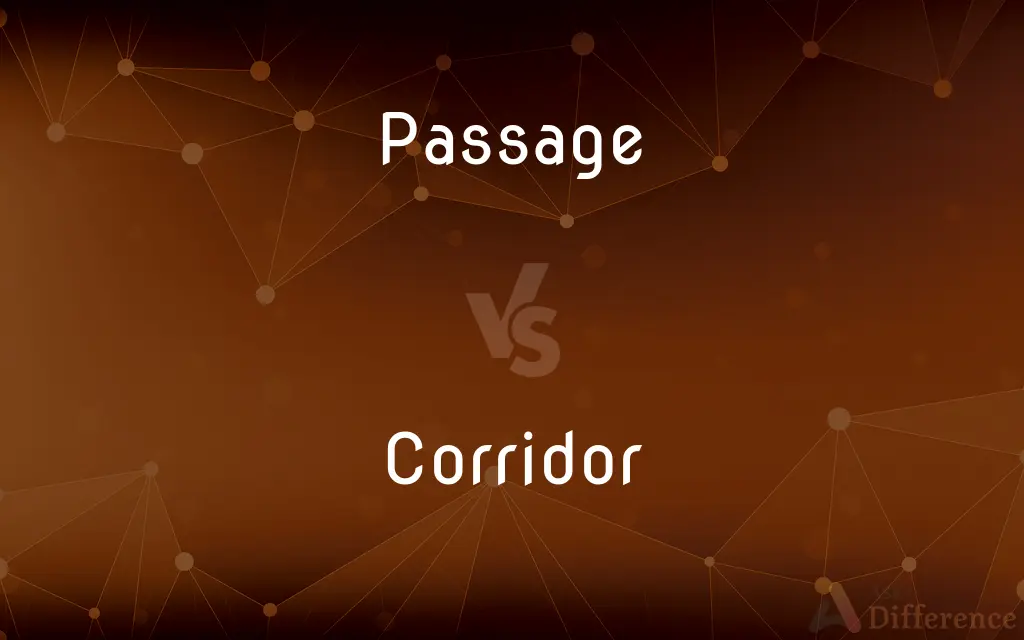Passage vs. Corridor — What's the Difference?
By Tayyaba Rehman — Updated on October 5, 2023
A passage denotes a way through or an act of moving through something. A corridor refers specifically to a long passage in a building, typically providing access to rooms.

Difference Between Passage and Corridor
Table of Contents
ADVERTISEMENT
Key Differences
A passage conveys a broad meaning, referring not only to physical pathways but also symbolizing the act or process of moving through time or a sequence in various contexts. In a narrower context, a corridor specifically designates a long, narrow passageway inside a building, connecting various rooms or sections.
Passages can metaphorically relate to periods of time or phases in one’s life, offering rich symbolic meanings in literary contexts. Corridors, however, do not carry the same metaphorical weight, as they mainly relate to physical spaces within architectural structures.
A passage may denote a specified path across, along, or through something, illustrating a more generalized usage in different contexts. Corridors remain precise in their reference, being an enclosed path within buildings, sometimes offering access to multiple doorways.
In textual contexts, a passage refers to a section or segment of a written work or speech, showcasing its flexibility in English usage. The term corridor does not share this textual application and remains steadfast in its architectural and spatial implications.
Passage also finds its place in nautical terminology, referring to a voyage from one place to another, demonstrating its diverse utility across various domains. Corridors do not extend to such varied meanings and stay confined to describing specific spatial layouts within structures.
ADVERTISEMENT
Comparison Chart
General Meaning
A way through or the act of moving through something.
A long passage in a building.
Metaphorical Use
Can symbolize phases or journeys in a broad sense.
Lacks such metaphorical applications.
Application
Used in various contexts including literature and nautical terms.
Primarily architectural and spatial.
Textual Relevance
Can refer to a section of text or speech.
Does not have a textual application.
Physicality
Not necessarily a physical space.
Always refers to a physical space.
Compare with Definitions
Passage
A path, channel, or duct through, along, or across something.
He found a secret passage behind the bookshelf.
Corridor
A typically narrow area providing certain environmental conditions.
The region is a corridor for migrating birds.
Passage
A journey, especially by sea.
The passage to Australia took several weeks.
Corridor
A long passage in a building from which doors lead into rooms.
He walked down the corridor to his office.
Passage
The action or process of moving through or past somewhere on the way from one place to another
There were moorings for boats wanting passage through the lock
Corridor
A strip of land or airspace providing a path.
The train traveled through the industrial corridor.
Passage
A narrow way allowing access between buildings or to different rooms within a building; a passageway
The larger bedroom was at the end of the passage
Corridor
An enclosed passageway connecting different sections of a building.
The hotel corridor was brightly lit.
Passage
The process of transition from one state to another
An allegory on the theme of the passage from ignorance to knowledge
Corridor
A long passage in a building from which doors lead into rooms
His room lay at the very end of the corridor
Passage
A short extract from a book or other printed material
He picked up the newspaper and read the passage again
Corridor
A narrow hallway, passageway, or gallery, often with rooms or apartments opening onto it.
Passage
The propagation of microorganisms or cells in a series of host organisms or culture media, so as to maintain them or modify their virulence
Cultured cells can replicate on serial passage for predictable periods of time
Corridor
A tract of land designated or used for a specific purpose, as for railroad lines, highways, or pipelines.
Passage
A movement performed in advanced dressage and classical riding, in which the horse executes a slow elevated trot, giving the impression of dancing.
Corridor
A route designated for a specific purpose
A hazardous material corridor.
A sea corridor for shipping.
A flight corridor.
Passage
Subject (a strain of microorganisms or cells) to a passage
Each recombinant virus was passaged nine times successively
Corridor
A route or tract of land used by migrating animals.
Passage
Movement from one place to another
The passage of water through a sieve.
Corridor
A thickly populated strip of land connecting two or more urban areas
People who live in the Boston-Washington corridor.
Passage
The process of elapsing
The passage of time.
Corridor
A narrow hall or passage with rooms leading off it, as in a building or in a railway carriage.
Passage
The process of changing from one condition or stage to another; transition
The passage from childhood to adulthood.
Corridor
A restricted tract of land that allows passage between two places.
Passage
Enactment into law of a legislative bill.
Corridor
The covered way lying round the whole compass of the fortifications of a place.
Passage
A journey, especially one by air or water
We had a rough passage on the stormy sea.
Corridor
Airspace restricted for the passage of aircraft.
Passage
The right to travel as a passenger, especially on a ship
Book passage.
Pay for one's passage.
Corridor
A gallery or passageway leading to several apartments of a house.
Passage
The right, permission, or power to come and go freely
Only medical supply trucks were granted safe passage through enemy territory.
Corridor
The covered way lying round the whole compass of the fortifications of a place.
Passage
A path, channel, or duct through, over, or along which something may pass
The nasal passages.
Corridor
Any relatively narrow passageway or route, such as a strip of land through a foreign territory.
Passage
A corridor.
Corridor
A densely populated stretch of land; as, the Northeast corridor, extending from Richmond, Virginia into Maine.
Passage
An occurrence or event
"Another encouraging passage took place ... when heads of state ... took note of the extraneous factors affecting their economies that are beyond their control" (Helen Kitchen).
Corridor
An enclosed passageway; rooms usually open onto it
Passage
Something, such as an exchange of words or blows, that occurs between two persons
A passage at arms.
Corridor
A defined path along which one has the right to travel.
The ship sailed through the international corridor.
Passage
A segment of a written work or speech
A celebrated passage from Shakespeare.
Passage
(Music) A segment of a composition, especially one that demonstrates the virtuousity of the composer or performer
A passage of exquisite beauty, played to perfection.
Passage
A section of a painting or other piece of artwork; a detail.
Passage
(Physiology) The process of discharging something from a bodily part, such as evacuation of waste from the bowels.
Passage
(Medicine) The introduction of an instrument into a bodily cavity.
Passage
(Obsolete) Death.
Passage
A slow cadenced trot in which the horse raises and returns to the ground first one diagonal pair of feet, then the other.
Passage
To execute such a trot in dressage.
Passage
To cause (a horse) to execute such a trot in dressage.
Passage
A paragraph or section of text or music with particular meaning.
Passage of scripture
She struggled to play the difficult passages.
Passage
Part of a path or journey.
He made his passage through the trees carefully, mindful of the stickers.
Passage
An incident or episode.
Passage
The official approval of a bill or act by a parliament.
The company was one of the prime movers in lobbying for the passage of the act.
Passage
The advance of time.
Passage
(art) The use of tight brushwork to link objects in separate spatial plains. Commonly seen in Cubist works.
Passage
A passageway or corridor.
Passage
(nautical) A strait or other narrow waterway.
The Northwest Passage
Passage
(caving) An underground cavity, formed by water or falling rocks, which is much longer than it is wide.
Passage
(euphemistic) The vagina.
Passage
The act of passing; movement across or through.
Passage
The right to pass from one place to another.
Passage
A fee paid for passing or for being conveyed between places.
Passage
Serial passage.
Passage
A gambling game for two players using three dice, in which the object is to throw a double over ten.
Passage
(dressage) A movement in classical dressage, in which the horse performs a very collected, energetic, and elevated trot that has a longer period of suspension between each foot fall than a working trot.
Passage
(medicine) To pass something, such as a pathogen or stem cell, through a host or medium.
He passaged the virus through a series of goats.
After 24 hours, the culture was passaged to an agar plate.
Passage
(rare) To make a passage, especially by sea; to cross.
They passaged to America in 1902.
Passage
To execute a passage movement.
Passage
Of a bird: Less than a year old but living on its own, having left the nest.
Passage red-tailed hawks are preferred by falconers because these younger birds have not yet developed the adult behaviors which would make them more difficult to train.
Passage
The act of passing; transit from one place to another; movement from point to point; a going by, over, across, or through; as, the passage of a man or a carriage; the passage of a ship or a bird; the passage of light; the passage of fluids through the pores or channels of the body.
What! are my doors opposed against my passage!
Passage
Transit by means of conveyance; journey, as by water, carriage, car, or the like; travel; right, liberty, or means, of passing; conveyance.
The ship in which he had taken passage.
Passage
Price paid for the liberty to pass; fare; as, to pay one's passage.
Passage
Removal from life; decease; departure; death.
When he is fit and season'd for his passage.
Passage
Way; road; path; channel or course through or by which one passes; way of exit or entrance; way of access or transit. Hence, a common avenue to various apartments in a building; a hall; a corridor.
And with his pointed dartExplores the nearest passage to his heart.
The Persian army had advanced into the . . . passages of Cilicia.
Passage
A continuous course, process, or progress; a connected or continuous series; as, the passage of time.
The conduct and passage of affairs.
The passage and whole carriage of this action.
Passage
A separate part of a course, process, or series; an occurrence; an incident; an act or deed.
The . . . almost incredible passage of their unbelief.
Passage
A particular portion constituting a part of something continuous; esp., a portion of a book, speech, or musical composition; a paragraph; a clause.
How commentators each dark passage shun.
Passage
Reception; currency.
Passage
A pass or en encounter; as, a passage at arms.
No passages of loveBetwixt us twain henceforward evermore.
Passage
A movement or an evacuation of the bowels.
Passage
In parliamentary proceedings: (a) The course of a proposition (bill, resolution, etc.) through the several stages of consideration and action; as, during its passage through Congress the bill was amended in both Houses. (b) The advancement of a bill or other proposition from one stage to another by an affirmative vote; esp., the final affirmative action of the body upon a proposition; hence, adoption; enactment; as, the passage of the bill to its third reading was delayed.
The final question was then put upon its passage.
Passage
The act of passing from one state or place to the next
Passage
A section of text; particularly a section of medium length
Passage
A way through or along which someone or something may pass
Passage
The passing of a law by a legislative body
Passage
A journey usually by ship;
The outward passage took 10 days
Passage
A short section of a musical composition
Passage
A path or channel or duct through or along which something may pass;
The nasal passages
Passage
A bodily process of passing from one place or stage to another;
The passage of air from the lungs
The passing of flatus
Passage
The motion of one object relative to another;
Stellar passings can perturb the orbits of comets
Passage
The act of passing something to another person
Passage
The act or process of moving through, under, over, or past something.
The passage through the mountain was perilous.
Passage
A portion of a written work.
The teacher asked us to analyze a passage from the novel.
Passage
The process of transition from one condition or stage to another.
The passage from childhood to adulthood can be tumultuous.
Common Curiosities
Can "passage" refer to text?
Yes, "passage" can refer to a section of text.
Is "corridor" used in specific architectural contexts?
Yes, "corridor" typically refers to a hallway in a building.
Can "corridor" suggest a specific direction?
Often, corridors suggest a linear, continuous passage.
Is "corridor" used metaphorically?
Rarely. "Corridor" is mainly used in literal, physical contexts.
Can "passage" imply a journey?
Yes, "passage" can refer to the act of passing from one place or stage to another.
Is "corridor" related to specific architectural designs?
Usually, it's a long hallway that gives access to rooms.
Can "passage" denote a right or opportunity?
Yes, it may refer to the permission or action of passing.
Can "passage" imply a transient experience?
Yes, it might denote a brief or transitory occurrence.
Can "corridor" be used in transportation?
Yes, such as in “transportation corridor,” denoting a travel route.
Can "passage" refer to a physical route?
Yes, "passage" can imply a way through which someone or something passes.
Are "passage" and "corridor" synonymous?
Largely, but "passage" might have broader uses.
Does "passage" have biological connotations?
Yes, it might refer to a pathway within an organism.
Does "passage" always denote physical movement?
No, it can be metaphorical, like "a passage of time."
Can "corridor" refer to non-architectural concepts?
It's possible, e.g., in "corridor of power," but it's less common.
Can "corridor" denote a limited path?
Typically, a corridor implies a constrained, defined pathway.
Share Your Discovery

Previous Comparison
Dammit vs. Damnit
Next Comparison
Eyeing vs. EyingAuthor Spotlight
Written by
Tayyaba RehmanTayyaba Rehman is a distinguished writer, currently serving as a primary contributor to askdifference.com. As a researcher in semantics and etymology, Tayyaba's passion for the complexity of languages and their distinctions has found a perfect home on the platform. Tayyaba delves into the intricacies of language, distinguishing between commonly confused words and phrases, thereby providing clarity for readers worldwide.















































